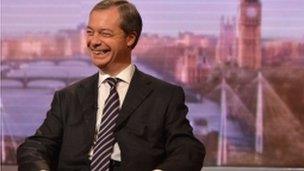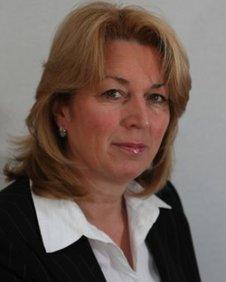Will Midlands turn 'UKIP factor' into 'UKIP fact'?
- Published
- comments

Which party, if any, will Nigel Farage's UKIP party damage the most in 2014?
"Predictions in politics are inherently unreliable because they are, by definition, merely projections of the present".
So said the late lamented doyen of journalists, authors and satirists, Malcolm Muggeridge.
His words of wisdom offer a timely warning to any of us who may be tempted to scan the daily outpourings of opinion pollsters in the hope of divining the likely outcome of the 2015 General Election.
What if, for example, the 2014/15 winter is plagued by power cuts? Or further hikes in energy prices?
Aren't these exactly the sorts of shocks, (absolutely no pun intended) that could lead to the number-crunchers themselves being given a good crunching?
But I mustn't fall into exactly the same trap St Mugg was warning us about: just because energy is the "hot button" issue now doesn't mean that it will be equally highly-charged in 18 months' time.
If Muggeridge were around today, he would probably urge us to be just as circumspect about the so-called 'UKIP factor'.
Suitably forewarned and forearmed, here goes:
Will Nigel Farage's party do most damage to the Conservatives?
The conventional wisdom is that it will. A poll by the former Conservative deputy chairman Lord Ashcroft recently suggested UKIP could draw so much support from Tories in marginal seats they might otherwise win from Labour, and in others that they might otherwise hold, that a new slogan was born: "Vote UKIP, get Labour".
Or to Labour?
A less fashionable view comes from the West Midlands MEP Mike Nattrass. Elected as a UKIP MEP, he resigned from the party last month and now sits as an Independent. He says UKIP's immigration policies will hit Ed Miliband's party hardest of all in their key seats.
Incidentally, Mr Nattrass currently sits as an Independent MEP in the European Parliament.
Which means both the successful UKIP candidates in the last European Elections in 2009 have now left the party to form new ones: Nikki Sinclaire will be standing for the We Demand a Referendum Now Party.
And what about Super Thursday?
We all know about "Super Tuesday" in the US Presidential merry-go-round. But save the date: Thursday, 22 May, 2014 will see polling not only for hundreds of seats in 19 local authorities across our region, but also for the seven seats representing nearly six million West Midlanders in the next European Parliament.
Part of the calculation is that by delaying the council elections so that they fall on the same day, each set of elections will bolster turnouts in the other.

Jill Seymour is in pole position on the UKIP candidate list in the West Midlands
UKIP's poll ratings encourage them to believe they can improve on the two European seats they secured last time. They hope this would give them a stronger springboard into 2015 than they managed last time.
By the time of the 2010 general election they suffered the dreaded "squeeze" so often endured by the "smaller parties" and fell back to just 4% of the vote.
Even allowing for Muggeridge's warnings, UKIP's recent poll ratings certainly encourage them to believe they are on the brink of a fundamental shift in British politics which mean they are a "smaller party" no longer.
There is no question that UKIP have broadened their message beyond their original single issue campaign: I have marvelled at how effectively they rallied their popular (or should that be populist?) campaigns themes; emphasising their anti High-Speed Rail credentials in some places and their pro-local hospital commitments in others.
How will all this gel together into a coherent theme for next year's European Elections?
That will be one of the questions I shall be putting to Jill Seymour, the chair of Kynnerlsey Parish Council in Shropshire.
But more to the point she was also recently named in first position on UKIP's candidates' list for next May.
And she will be one of my guests on this week's Sunday Politics from 11.00 on BBC One in the West Midlands.
And I hope you will be able to join us too.